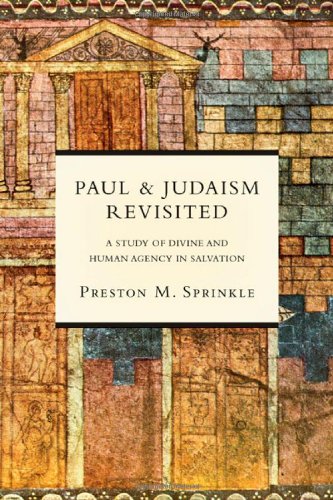Book review: Paul and Judaism Revisited
by Preston M. Sprinkle
★★★★★
This is one of those books that you are going to love if you’re intrigued with this stuff (the New Perspective on Paul), and hate if you’re not. I ate it up. It’s a relatively hard read, even though the Greek language is kept to a minimum. Beginners in Pauline theology may feel overwhelmed, but more studied theologians will be captivated.
The question is, where did Paul get his ideas, and exactly what does he teach regarding salvation? Is salvation conditional upon works, or is it a gift by the grace of God? A quick scan will uncover a lot more works-based verses in the Pauline writings than you might think. Perhaps there are two instances requiring salvation: the initial inbreaking of the Kingdom, fulfilling the prophecies of acceptance by faith/grace, and the final judgment, in which the prize must be earned? Does that mean God’s gift incurs an obligation, and is that obligation tied to the works of the Law? What exactly is Paul’s hangup with the Law, anyway? Sprinkle admits that the one single verse that set him on this journey is found in the Law of Moses:
Ye shall therefore keep my statutes, and my judgments: which if a man do, he shall live in them: I am the LORD. –Leviticus 18:5
After a review of the Old Testament’s two conflicting ideas about restoration—Deuteronomic, which requires human repentance, and prophetic, in which God’s promise is unconditional—Sprinkle gears up to the New Testament and Paul’s take on salvation: justification and human agency, the role of the eschatological Spirit, and anthropology. He compares Paul with the Qumran community, noting their similarities and differences. (There are some short comparisons with other Judaic writings, but the major focus is on the Dead Sea Scrolls.)
It’s worth noting that Sprinkle is a devoted Christian who does not consider Qumran writings to be inspired. Thus, determining the true flavor of Paul’s message, especially where it contrasts other Judaic thinking, is of fundamental importance. The research is very scholarly and convincing, and the footnotes are legion and quite interesting.
Definitely recommended.












 354 Circles
354 Circles
 603 Goodreads Friends & Fans
603 Goodreads Friends & Fans

 Hello! I'm an author, historical Jesus scholar, book reviewer, and liberal Christian, which means I appreciate and attempt to exercise the humanitarian teachings of Jesus without getting hung up on any particular supernatural or religious beliefs.
The Bible is a magnificent book that has inspired and spiritually fed generations for thousands of years, and each new century seems to bring a deeper understanding of life’s purpose. This is true of not only Christianity; through the years, our age-old religions are slowly transforming from superstitious rituals into humanitarian philosophies. In short, we are growing up, and I am thrilled to be riding the wave.
I avidly read all thought-provoking religion titles. New authors: I'd love to read and review your book!
Hello! I'm an author, historical Jesus scholar, book reviewer, and liberal Christian, which means I appreciate and attempt to exercise the humanitarian teachings of Jesus without getting hung up on any particular supernatural or religious beliefs.
The Bible is a magnificent book that has inspired and spiritually fed generations for thousands of years, and each new century seems to bring a deeper understanding of life’s purpose. This is true of not only Christianity; through the years, our age-old religions are slowly transforming from superstitious rituals into humanitarian philosophies. In short, we are growing up, and I am thrilled to be riding the wave.
I avidly read all thought-provoking religion titles. New authors: I'd love to read and review your book!
 Hi! While Lee writes the articles and reviews the books, I edit, organize, and maintain the blog. The views expressed here are Lee's but I'm his biggest supporter! :-)
Hi! While Lee writes the articles and reviews the books, I edit, organize, and maintain the blog. The views expressed here are Lee's but I'm his biggest supporter! :-)
0 Comments
Trackbacks/Pingbacks